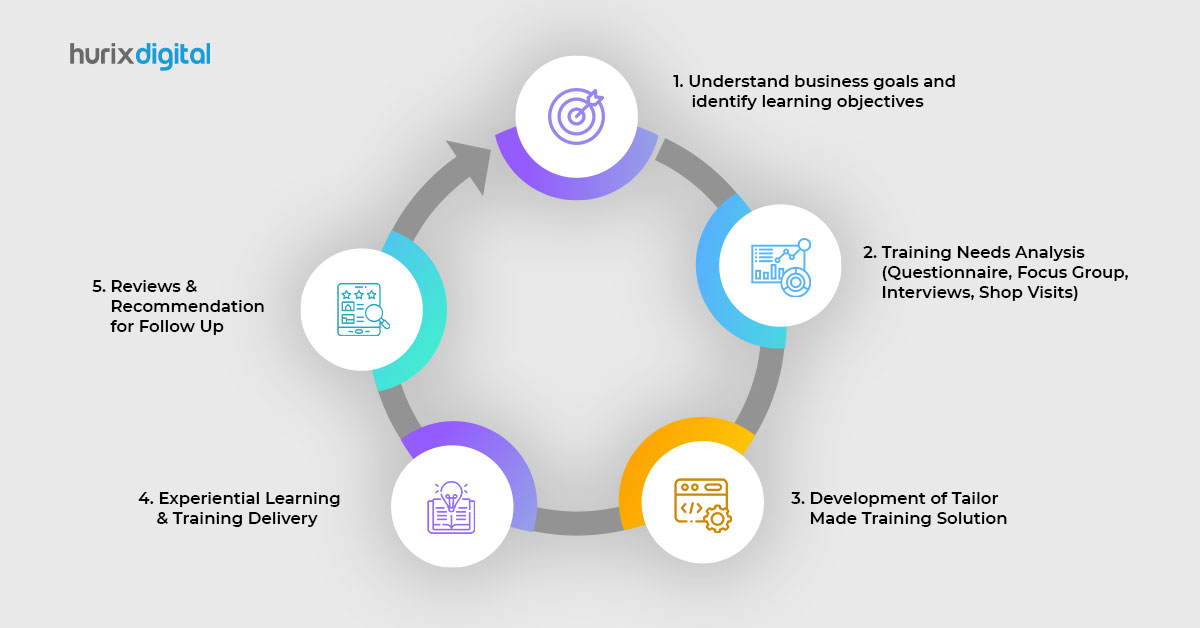6 Sales Training Simulations That Address Real-World Challenges
Simulation training for sales professionals is primarily created to help them deal with a wide variety of real-world sales performance challenges. Simulations can also be a great tool to train the new hires as well as experienced sales employees in the organization.
Sales training simulations are immersive experiences that replicate the real marketplace. During the simulation-based sales training, participants-
- Get to experience an entire sales cycle from identification of the opportunity to closing the deal
- Receive in-depth feedback on their sales skills and sales strategy throughout the sales cycle
- Compete against each other
- Integrate all their previous sales training and product training experiences
Know More : How Can Enterprises Implement Simulation Training for Employees
Why should enterprises consider simulation training for sales professionals?
Sales professionals are vital assets for every organization. In today’s competitive world, sales training simulations offer an excellent way to help sales personnel improve their skill sets, and competencies and support their overall learning and development. The fully immersive, standalone, or modular elements of sales training help to re-create an industry-specific real-world challenging scenario in which the sales skills of executives are put to the test.

Here are some of the key advantages of using sales simulation software for training:
- Carefully planned sales simulation training allows sales reps to focus on challenges in the real world while also offering a high positive impact on the organization as a whole
- Enables companies to teach their sales force to comprehend, adjust and develop skills that are required to navigate the ever-changing sales market needs
- Sales training simulations offer everything from context, content, and process, which are relevant and directly applicable on the job
- Simulations can be used for specific skill development
- Helps to shorten the sales cycle because of immediate feedback given
Know More : Reasons Why Organizations Needs Simulation Training
Top 6 sales training simulations to help employees learn about real-world challenges
1. Making a sales strategy to accelerate pipeline
The sales strategy simulation is a highly engaging and competitive simulation designed to encourage sales teams to leverage critical thinking skills and develop the required on-the-job behaviors/ skills to win high-value, complex sales deals.
This simulation technique allows the sales personnel to learn-
- Strategies to better manage the customer buying process
- How to build consensus and drive urgency around a sales decision
- How to identify and manage key influencers
- How to prevent opportunities from stalling in the sales pipeline
- Ways to identify and influence critical decision criteria
- Ways to develop proactive movement strategies
- How to analyze the competitive landscape
2. Improving sales forecasting accuracy
Sales forecasting is one of the most critical aspects of a business’s success. However, new sales representatives in any organization are often unable to clearly define sales stages and critical milestones in each stage, resulting in various stalled or lost opportunities.
This simulation is specially designed and customized to help sales representatives define various stages of the sales process effectively, with each stage centered around critical sales process milestones. It allows the executives to learn-
- Ways to identify critical milestones and sales pipeline stages
- How to identify essential decision-making criteria
- Techniques to improve sales forecasting
- To better understand the buying process, timeline, etc., and close more deals
3. Handling customer conversations
This remarkable sales training simulation addresses the real-life challenge of the time it takes a new sales representative to close their first sales deal. It is essentially a peer-to-peer-based learning program that helps sales personnel build the necessary skills to help a deal from start to finish.
In this simulation, sales reps learn to make the sales call, handle conflicts/objections, ask high-impact questions, co-create solutions that enhance customer value, and close the deal.
Know More : How Does Realistic Simulation Enhance K-12 Learning?
4. Sales assessment simulation to identify skill gaps
Accurately assessing skill and competency is a critical component of any effective sales development strategy. This simulation technique helps the sales executive provide an objective measure of their abilities by utilizing sophisticated and well-designed business simulation assessments.
A sales assessment simulation is an effective tool for measuring everyone’s individual, functional, and organizational skills and competencies, including first-time sales managers or even senior sales executives.
It allows executives to learn-
- Real-life business challenges and opportunities
- Techniques to react to key sales situations and identify areas in which further support and development are required
- How to identify their strengths, along with identifying areas for additional focus
5. Sales skills application
This is another sales training simulation to drive sales reps’ proficiency to ensure they are always operating with maximum effectiveness at the highest level.
This simulation works in tandem with the above-mentioned sales improvement initiatives. It replicates, at the highest level, real-world scenarios to enable your sales team to take their selling skills to the next level. This simulation technique allows your sales personnel to learn-
- How to effectively research a potential customer and their unique needs
- How to plan for and execute effective sales meetings
- Ways to receive feedback and reassess the existing situation and strategy
6. Sales best practices simulation
Sales best practices business simulations enable your sales teams to learn the industry-specific best practices and behaviors related to a skill or set of competencies. These simulations are specially designed to focus on varied issues that sales representatives regularly address in the areas of strategic business selling and execution of processes.
In this simulation, participants take the role of a simulated character and make their way through a pre-designed storyline by reacting to events, making sales decisions, and interacting with virtual colleagues, employees, and customers. At the end of each simulation, a facilitator discusses the reps’ choices and how to apply those best practices to their respective sales jobs.
This simulation technique allows your salespeople to learn-
- New behaviors and make strategic business decisions in a risk-free environment, thus giving them the required confidence to do the same on the job
- How to receive both qualitative and quantitative feedback to illustrate the consequences of the choices they make
- Ways to provide feedback, managing relationships, and performances, achieving business results, and more
Know More : 7 Ways to Leverage Simulation Training Across Industry Verticals
To Wrap
Simulations are regarded as one of the most effective forms of training. Today, organizations across sectors realize the benefits of using simulations in sales training and have started incorporating them in their training process.
It allows them to create a realistic environment to test various scenarios and offers sales reps the opportunity to make mistakes in a safe environment with no consequences in the real world.
Need to know more about our Products & Services ? Drop us a Note.
We respect your privacy. We use the information you provide us to send you relevant content about industry trends and our products & services. You may unsubscribe from our list at any time. For more information, check out our Privacy Policy










